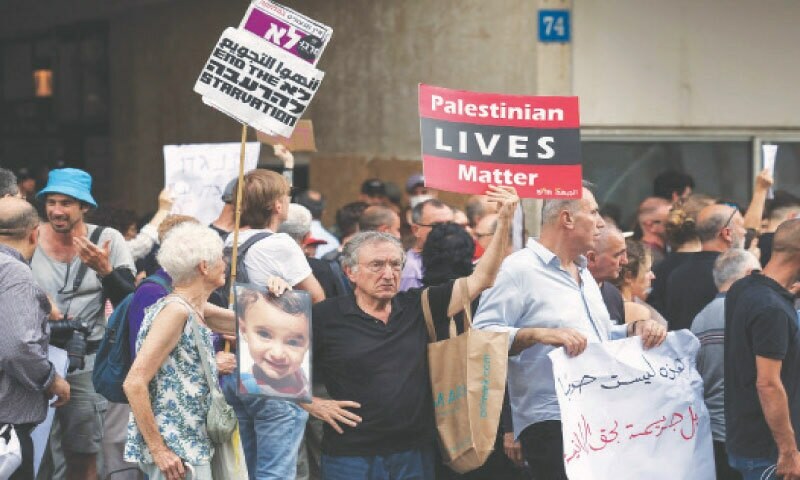• UN agencies, Rome-based IPC sound alarm; WFP official compares situation to Ethiopian, Biafra famines
• UK moves towards ‘recognition’ of Palestinian state; Ishaq Dar calls it ‘test case’ for the world
GAZA / LONDON: The besieged territory of Gaza is slipping into famine, UN aid agencies warned on Tuesday, as the death toll from Israel’s nearly 22-month war surpassed 60,000.
The World Food Programme (WFP), Unicef and the Food and Agriculture Organisation (FAO) warned that time was running out and that Gaza was “on the brink of a full-scale famine”.
Meanwhile, the Rome-based Integrated Food Security Phase Classification Initiative (IPC) air-drops will not be enough to avert the “humanitarian catastrophe”.
“The worst-case scenario of famine is now unfolding in the Gaza Strip,” said the IPC, a grouping of NGOs and institutions that serves as the world’s main monitor for gauging malnutrition, in a statement.
The IPC said its latest data shows that “famine thresholds” have been reached in most of Gaza and hunger-related deaths of young children were rising fast.
Although Israel launched daily pauses in its military operations in some parts of Gaza over the weekend, and opened secure routes to enable UN and other aid agencies to distribute food, Israeli strikes continued overnight, killing 30 people in the Nuseirat refugee camp.
Speaking in Geneva, the WFP’s emergency director Ross Smith said the humanitarian disaster was reminiscent of last century’s famines in Ethiopia and Nigeria’s Biafra region.
“This is unlike anything we have seen in this century,” he told reporters.
UK move towards recognition
Following an emergency meeting of his cabinet, UK PM Keir Starmer had announced that Britain would make the move unless Israel took substantive steps to allow more aid to enter Gaza, made clear there will be no annexation of the West Bank and commits to a long-term peace process that delivers a two-state solution.
Starmer said his government would make an assessment in September on “how far the parties have met these steps”, but that no one would have a veto over the decision.
“I have always said that we will recognise a Palestinian state as a contribution to a proper peace process at the moment of maximum impact for the two-state solution,” he said in a Downing Street address.
France recently announced it would formally recognise the state of Palestine in September, and the UK would become the second permanent member of the UN Security Council to do so, if it goes ahead with the recognition.
UN conference
Meanwhile, Deputy Prime Minister and Foreign Minister Ishaq Dar has termed the Israel-Palestine question a “test case” for the world, particularly the United Nations, and sought “credible and enforceable international action”.
His call came during the three-day conference on ‘The peaceful settlement of the question of Palestine and the implementation of the two-state solution’, co-chaired by France and Saudi Arabia.
In his remarks, Deputy PM Dar told the conference, “The Palestinian question is a test case for the United Nations and the world. Pakistan reaffirms its unwavering and principled support for the Palestinian people’s inalienable right to self-determination, including their right to a viable, independent and contiguous State of Palestine, based on the pre-1967 borders, with Al-Quds Al-Sharif as its capital.”
During his speech, Mr Dar urged the conference to “ensure universal recognition of the state of Palestine and its full UN membership”.
He said, “Pakistan stands ready to extend dedicated technical assistance and capacity building support to our Palestinian brothers and sisters… Pakistan is prepared to contribute to the building of institutions, including through participation in the Arab-OIC Plan, and any international protection mechanism.
“The question of Palestine has impacted the entire region and beyond. We must give hope to the Palestinian people. The occupation must end, and end now. It is time for freedom, self-determination and statehood, and Palestine’s full membership of the UN. That will be the best guarantee for lasting peace in the region.”
On the sidelines of the conference, Mr Dar met Palestinian PM Mohammad Mustafa and held a detailed exchange on the grave situation in Gaza and occupied Palestinian territory.
He also met Kuwait’s Foreign Minister Abdullah Al-Yahya, expressed their “deep concern at continuing Israeli acts of aggression against Palestinians and worsening humanitarian situation in Gaza”.
Published in Dawn, July 30th, 2025



